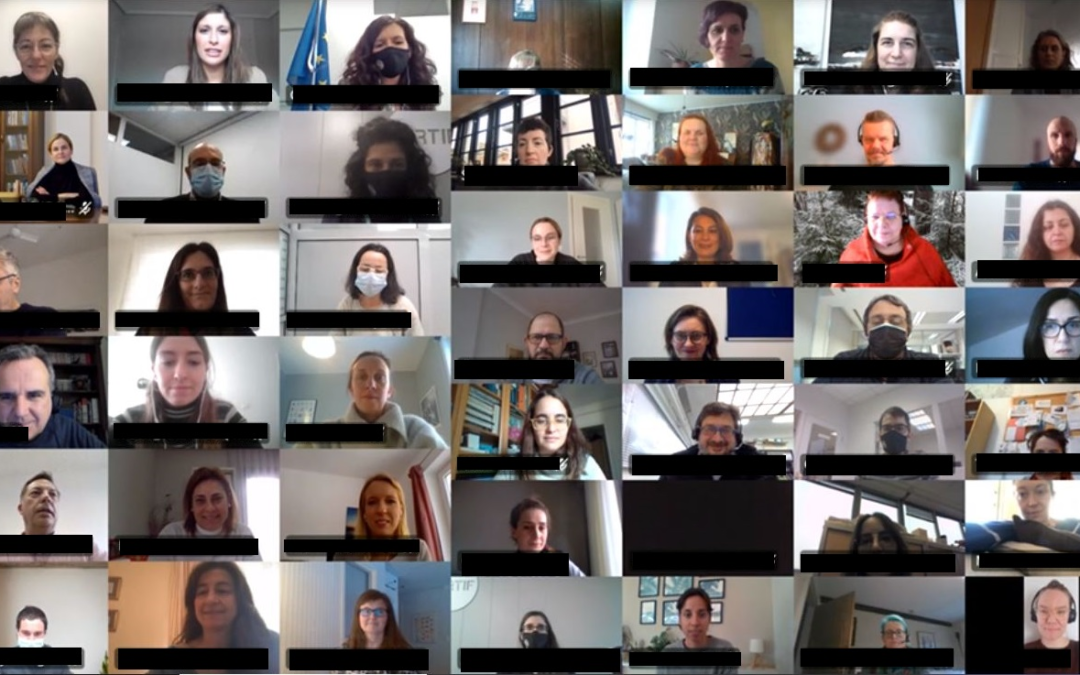The core ambition of FUSILLI is to overcome barriers for developing and implementing integrated, systemic food policies that support the transition towards sustainable food systems in urban, peri-urban and nearby rural areas. To achieve this goal, FUSILLI puts 12 cities in a knowledge sharing and learning network to address the challenges of the food system transformation: San Sebastian (Spain), Nilufer-Bursa (Turkey), Oslo (Norway), Kolding (Denmark), Turin (Italy), Castelo Branco (Portugal), Differdange (Luxemburg), Rijeka (Croatia), Kharkiv (Ukraine), Tampere (Finland), Athens (Greece) and Rome (Italy). These cities will integrate food as a part of their urban-rural agenda and identify and create opportunities to transform food systems into sustainable, healthy and inclusive systems. Via an open knowledge community, cities will be empowered to implement innovative and personalized policies and actions, placing citizens in the heart of the process.
On 27 and 28 January 2021, more than 100 individuals from 34 organisations met to kick-off their work on FUSILLI, working collaboratively within seven work packages and over a duration of four years. Policy Officer Tatiana Tallarico from DG Research and Innovation of the European Commission welcomed the consortium and talked about “Urban food systems transformation in the EU policy”, referring also to the recent “Farm to Fork” strategy of the European Green Deal aiming to make food systems fair, healthy and environmentally-friendly. As part of her presentation, she also referred to the COVID-19 pandemic and how it highlights the need for more robust and resilient food systems as well as stronger support for people working within this field, who suffer most from economic disruptions and low wages.
The foundation of FUSILLI will be the 12 Food 2030 Living Labs: Each city will develop a living lab as an open innovation ecosystem with the objective to implement different innovative actions through all stages of the food chain, including production and processing, distribution and logistics, consumption, food loss and waste, as well as governance. Through the FUSILLI Knowledge Community and supported through urban food plans, the partners will identify existing best practices and thus support participating living labs, related initiatives and policy makers in the development of sustainable food systems.
All FUSILLI cities have different starting points and thus different needs, which will help to cover a wide variety of European cases. Rome, for example, “has the same size as London, but only a third of its inhabitants. Like this, we have a lot of agriculture on the surroundings and, but now we need to bring this healthy food more into the metropolitan area of the city”, says Claudio Bordi from Risorse per Roma. In Tampere, Finland, “there are already a lot of sustainable food activities going on, like vertical or urban farming, but we want to expand those to create living labs in schools and pop-up restaurants on seasonal and climate food”, says Karoliina Tuukkanen from the City of Tampere. And in Differdange, Luxembourg, “there is a high dependency on food import, which has established itself as a problem during the COVID-19 pandemic and which will be tackled as part of the FUSILLI project”, according to Martin Kracheel from Ville de Differdange.
FUSILLI project combines the expertise of 34 partners from 13 countries, including cities, universities, SMEs, NGOs, and industries. For further information, visit the FUSILLI twitter channel via @Fusilli_Project and the official project website www.fusilli-project.eu (coming soon).
FUNDACION CARTIF, SPAIN
DEMIR ENERJI, TURKEY
STICHTING VU, NETHERLANDS
OSLO METROPOLITAN UNIVERSITY, NORWAY
IZMIR DEMOCRACY UNIVERSITY, TURKEY
STEINBEIS INNOVATION GGMBH, GERMANY
ACONDICIONAMIENTO TARRASENSE – LEITAT, SPAIN
SYDDANSK UNIVERSITET, DENMARK
UNIVERSIDAD DE VALLADOLID, SPAIN
TAMPERE UNIVERSITY OF APPLIED SCIENCES LTD, FINLAND
V. N. KARAZIN KHARKIV NATIONAL UNIVERSITY, UKRAINE
WINGS ICT SOLUTIONS INF. & COMM TECHNOLOGIES IKE, GREECE
CIVIESCO SRL, ITALY
TECNOLIMENTI SCPA, ITALY
FOMENTO SAN SEBASTIAN, SPAIN
NILUFER BELEDIYE BASKANLIGI, TURKEY
OSLO KOMMUNE, NORWAY
KOLDING KOMMUNE, DENMARK
COMUNE DI TORINO, ITALY
KHARKIV CITY COUNCIL, UKRAINE
VILLE DE DIFFERDANGE, LUXEMBOURG
TAMPEREEN KAUPUNKI, FINLAND
CITY OF RIJEKA, CROATIA
CM CASTELO BRANCO, PORTUGAL
MUNICIPALITY OF ATHENS, GREECE
CITY OF ROME, ITALY
EROSKI S. COOP, SPAIN
TERRITOIRE NATUREL TRANSFRONTALIER CHIERS-ALZETTE, LUXEMBURG
FONDAZIONE DELLA COMUNITÀ DI MIRAFIORI ONLUS, ITALY
ECOFELLOWS LTD, FINLAND
AHLMANIN KOULUN SÄÄTIÖ SR., FINLAND
DIMOS ATHINAION EPICHEIRISI MICHANOGRAFISIS, GREECE
UNIVERSITE DU LUXEMBOURG, LUXEMBOURG
RISORCE R.P.R. SPA, ITALY
